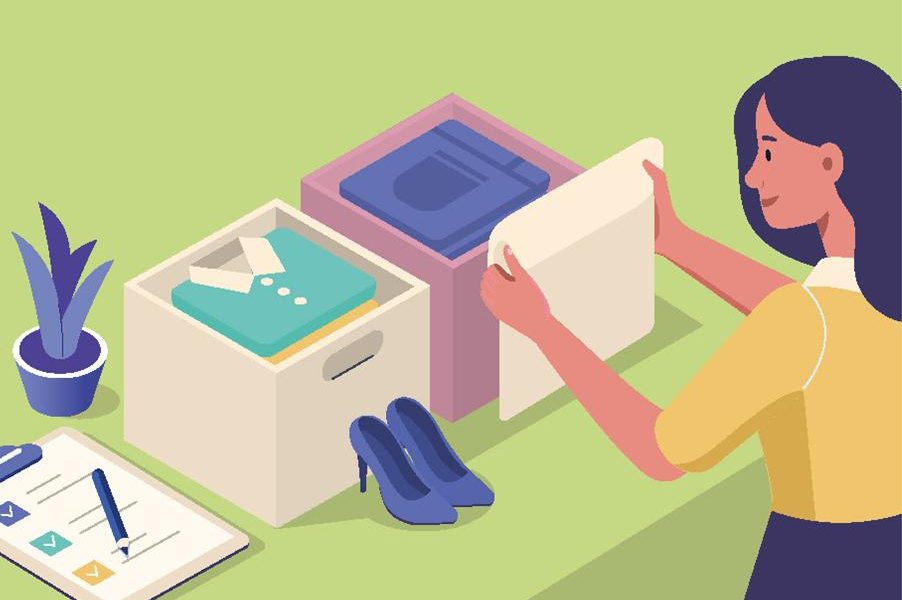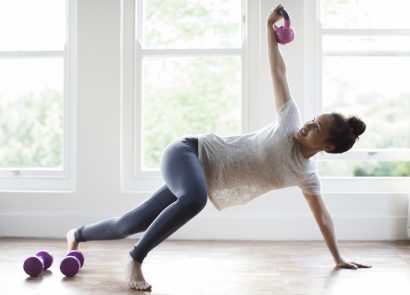This time of year is synonymous with spring cleaning, but should we all be doing it? We take a look at the surprising benefits of decluttering on your body and mind…
Why do people hoard?
“One of the major reasons is the feeling of security that hoarding brings,” says Mary Lambert, in her book The Joy of Living with Less. “Some people become emotionally attached to the things around them. Looking at objects or other accessories that they have acquired over the years makes them feel happy and safe. Some even keep mementos from unhappy events, refusing to remember the pain involved, or hang on to a gift that they dislike for fear of upsetting the person who gave it to them if they passed it on. Giving away or throwing out items they no longer need but to which they have an emotional attachment can be painful, tantamount to rejecting a friend’s generosity.”
Are you a hoarder?
This questionnaire will help you work out if you are hoarding too many possessions or unwanted items in your home. Score two points for a “Yes,” one for a “Sometimes,”and zero for a “No.”
1. Can you park your car in your garage, or is it too full of stuff?
2. Are your bookshelves filled with books that you’ve never read?
3. Do you have piles of unread magazines and newspapers everywhere?
4. Do you store unused or broken items under your bed?
5. Are piles of junk mail left by your front door?
6. Is your closet bulging with clothes that you don’t wear?
7. Is your purse, bag, or work bag full of old pens, receipts, candy wrappers, and other worthless trivia?
8. Can you hardly get in your attic because you have so much stuff stored up there?
9. Have you kept all your old school certificates or sports awards?
10. Is your sock or knicker drawer so full you can hardly get it open?
11. Do you have lots of framed photographs or art prints that have never been displayed stacked in a closet?
12. Do you still keep shoes or boots even if you don’t like them any more, they are badly worn, or have broken heels?
13. Are you storing sports or fitness equipment that has never been used?
14. Are you keeping photographs (prints or digital versions) of people who are no longer friends?
15. Are unfinished craft projects scattered around your home?
16. Is your home office full of paperwork that you have never got around to filing?
17. Do you have old phones or broken electronic equipment stored in your home?
18. Is your computer full of undeleted emails from months ago?
19. Do you dislike some of the accessories or pictures in your home but never quite get around to disposing of them?
20. Do you have any presents from friends or family, stored in the attic or a cabinet, that have never seen the light of day?
The results:
30-40: Your hoarding tendencies are getting out of control. Start to look at ways of curbing your spending habits. You can now also pinpoint some of the key areas you will need to tackle first when you start the overall challenge of reducing all the possessions in your home. Become more ruthless in getting rid of things and ask yourself: Do I need, want, or use this?
20-29: Although hoarding is not a major problem for you, it could start to get out of control, so set a date to start offloading your superfluous possessions.
10-19: Hoarding is not a big issue for you yet. But do start looking at what you are willing to give away.
Below 10: You are not by habit a hoarder, so you should have no problem in releasing some possessions.
Did that questionnaire reveal some uncomfortable truths about yourself? I know it did for me. I had never previously considered myself a hoarder – in my mind, the word conjures up an image of a house that’s so full, so you can’t even see the floor, like the ones featured on Channel 4’s Britain’s Biggest Hoarder. But, it turns out that although these are more extreme examples, I do have a tendency to hoard. Among other embarrassing things, my handbag is a graveyard for old receipts and I do have several craft projects on the go scattered around my flat. So, I turned to the experts to find out what benefits decluttering could really afford me.
You can regain control of your life
“Lack of control in your life can be very anxiety-inducing,” says Dr Megan Jones Bell, chief science officer at Headspace (headspace.com). “Life, by nature, is often unpredictable; however, the possessions you own are something you can easily curate. We have all experienced the desire to fill our wardrobes with the latest season’s clothes or buy the most up to date technology. These items might give you a moment of gratification, but this feeling is not usually long-lasting. By approaching your life in a simpler way, you create a lifestyle that doesn’t rely on material objects and gives you the freedom to focus on what you already have.”
It’s therapeutic
“Often, we cling to or hoard items relating to unresolved issues or unhappy life chapters from our past,” explains Alexandra Lees, feng shui consultant, wellbeing coach and co-founder of Wu Wei Wisdom (wuweiwisdom.com). “As you carefully sort, remove or store every item in your home, you must mindfully consider their current value to your life right now.”
It can improve your sleep and mood
“A healthy home is bright, clean, tidy and uncluttered one with fresh and free-flowing energy,” says Alexandra. “This helps us feel vibrant, energised and lifts our mood. By contrast, a home that is cluttered, dusty, dirty or dark, has stagnant energy and this results in us feeling tired, sluggish and uninspired in our daily life. Your bedroom deserves special attention when decluttering, as an untidy or excessively furnished bedroom will affect the quality of your sleep. A messy home-office will impact your personal productivity and creativity.”
It gives you clarity of mind
“We all know how rewarding it can be when we finally sort through our wardrobes and throw out that pile of unwanted belongings that we’ve been hoarding,” says Dr Megan. “Decluttering not only makes your space nicer to spend time in, but also gives you clarity of mind. Overthinking can induce stressful thoughts and by creating a space that is simple and distraction-free, you can let go of tension and distracting thoughts in your mind.”
Your home becomes your sanctuary
“The fewer unnecessary possessions you hoard in your house, the more space you have to enjoy,” Dr Megan tells us. “By discarding needless items, you can make your home your haven: a place you can come back to at the end of the day and feel calm and unwind. By simplifying the space you spend time in, the area becomes a blank canvas for your thoughts, helping you to observe them more objectively with less judgment.”
Stop the clock
Convinced about decluttering, but not sure how to fit in your busy schedule? I asked professional organiser Vicky Silverthorn, author of Start with your Sock Drawer (youneedavicky.com) how to start the decluttering process when you’re short of time – here are her top tips.
If you have 10 minutes…
This is the perfect amount of time to assess your space (choose a small area) and make a plan. Examine it as if it was the first time you’ve looked at it to see what you don’t like about it and what you goal would be (less stuff, clearer space, relocate the items, make it tidier?). Think about what you want the end result to be. You can pull the contents of a small shelf or surface off, lay it out neatly elsewhere and choose any items you want to go. Wipe the surface and replace the items as you wish.
If you have 20 minutes..
Head for your sock drawer, empty the contents all at once, then lay it all out in basic categories (sports, fancy, day-to-day etc.). Clean the drawer, then replace everything in sections, adding in drawer dividers if you feel like it’s necessary (Ikea Skubb are ideal – £5 for a set of six, ikea.com).
If you have 30 minutes…
Pull out the contents of a kitchen cupboard, then lay it out in basic categories. Check through the dates of any food, and then put a pile aside for anything you know you won’t use (for the food bank) and a pile of out of date items for the rubbish. Move shelves up and down if possible to suit the items within that cupboard, and put the items that need to be used up first at the front. Style it like a shop, using neat lines and not stacked. Only add additional storage if you need to, such as baskets for little bits and containers for open food – I love Oxo Pop containers for this because they’re lightweight and safer than glass. I also like bamboo steps (available on Amazon) for spices because you get to see items at the back.
For more, read this
The Joy of Living with Less by Mary Lambert, (CICO Books, £9.99)




















